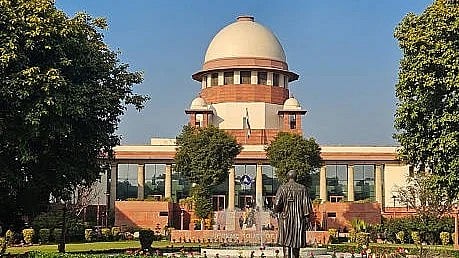
Supreme Court of India
Credit: iStock Photo
New Delhi: The Supreme Court has asked the Karnataka High Court to decide the priority of first charge amongst the EPFO and the secured creditors, the Axis Bank and other two Banks, over the money received from sale of properties of an establishment which defaulted in deposit of provident fund dues.
A bench of Justices Vikram Nath, Sanjay Karol and Sandeep Mehta set aside the High Court's order of February 1, 2024, which rejected a plea by M/s Edelweiss Asset Reconstruction Limited.
The appellant, EARC led by senior advocate Krishnan Venugopal admitted that the dues of EPFO have a first charge. However, it contended that the Axis Bank has sold one property for 12 crores approximately whereas, appellant has sold two properties for total consideration of Rs 7 crores.
It said, the balance amount of EPFO may be recovered from the Axis Bank as EARC has already paid an amount of Rs 75 lakhs, proportionate to the sale consideration received by it.
It said the balance amount due to the EPFO which apparently has been stayed by the High Court for the amount quantified under Section 14(B) of the PF Act amounting to Rs 1.3 crores approximately would fall in proportionate share of the Axis Bank.
The recovery for the balance amount if ultimately EPFO succeeds before the High Court for its demand under Section 14(B) of the PF Act should be made from Axis Bank and not from the appellant, it said.
The EPFO, represented by advocate Dushyant Parashar, said the High Court has rightly dismissed the petition of the appellant and, therefore, it is entitled to recover the balance amount of Rs 3,43,629 and the amount of Rs 1.3 crores approximately quantified under Section 14(B) of the PF Act, as and when, the EPFO succeeds before the High Court.
It further submitted that the appellant had not impleaded Axis Bank before the High Court and, therefore, the contention of the appellant that balance recovery may be made from Axis Bank with respect to the amount quantified under Section 14(B) of the PF Act cannot be sustained.
The Axis Bank, led by senior advocate Gopal Jain submitted in view of the provisions contained in Section 35 of the SARFAESI, the dues of the Bank being secured would have a priority over the sales taxes and other dues payable to the government or local authority and, therefore, no recovery can be made from it till such time its entire dues are liquidated and satisfied.
After hearing the counsel, the bench said, "In our considered opinion, it would be appropriate that the High Court first deals with the issues raised by Axis Bank that it has first charge and priority over and above the EPFO to satisfy its dues from the secured property in view of Section 35 of the SARFAESI Act."
It said that the High Court will examine the priority of first charge amongst the EPFO and the secured creditors i.e. the Axis Bank and other two Banks, namely, State Bank of India and the State Bank of Travancore (now taken over by SBI) in view of Section 11(2) of the PF Act.
'The High Court will take into consideration, the relevant fact relating to the charge having been created by the EPFO over the properties to be auctioned by the Axis Bank prior to the auction," the bench said.
The court pointed out material in this regard has been placed before it but since it was not entering into the merits of that issue relating to first charge and priority, it was not dealing with the same in detail.
"All the parties to the writ petition as it would stand now after remand would be at liberty to raise all contentions before the High Court," the bench said.
The dispute arose after M/s Acropetal Technologies Pvt Ltd, covered under the ambit of Employees Provident Fund and Miscellaneous Provisions Act, 1952, defaulted in payment of provident fund dues since July, 2013.
